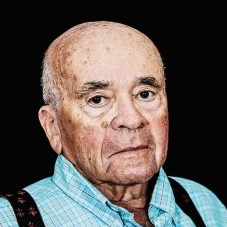click to dowload our latest edition
CLICK HERE TO SUBSCRIBE TO OUR NEWSLETTER


Published
5 years agoon
By
adminJORDAN MOSHE
The now 92-year-old Lithuanian-born survivor shared his extraordinary story with a spellbound audience at The Base in Glenhazel last Saturday night. “The world should know what happened,” he said. “I’ve got to tell the world how evil the Russians have been throughout history.”
Perlov, who lives in Johannesburg, has committed his life to sharing his story with others and exposing the evils of the Russian state.
His experiences have been captured on camera in a documentary, Because of Stalin, by Johnathan Andrews slated for release later this year. Perlov has also published a book with his cousin, Once Were Slaves: A Journey Through the Circles of Hell, and he is often invited to speak about his experiences at events.
The film and book tell the story of his journey, attempts to reunite his family, and his resilience in getting back to life. His journey took him through northern Russia, Poland, Ukraine, Italy, Cyprus, Israel, and eventually South Africa, where he became a successful businessman.
“Whether it’s the tsar, Stalin, or Putin, they are all murderers, and many people in the world don’t know about it,” said Perlov. “Even when I started telling [my own family] about it, they said I was talking a lot of bull. I kept quiet for many years. Now, I need to bring a message to humanity.”
Born in 1926 in the shtetl of Rasein in Lithuania, Perlov’s family were part of about 5 000 Jewish residents who made up about 40% of the town’s population. His family owned a timber and flour mill, and lacked nothing. All this would change when Stalin occupied Lithuania in 1939.
“We lost our liberty,” says Perlov. “They nationalised all the belongings of my parents, and told us to get out of our home. We went to stay with my maternal grandmother for a short time, and were then deported to a hell.”
In June 1941, one week before Hitler attacked Russia, a list of “enemies of the state” including Jews, Poles and Lithuanians was finalised. The dreaded NKVD (the People’s Commissariat for Internal Affairs) – the forerunner to the Soviet KGB (Committee for State Security) – used the list to arrest hundreds, the Perlov family among them.
In one week, 871 freight cars sent more than 30 000 people to remote places in the Soviet Union, 40% of them under the age of 16. From 1941 to 1942, the Germans came into Lithuania, and 95% of Lithuanian Jewry perished, the highest attrition rate in all of Europe.
Perlov and his family were sent to Ust’-Lokchim, a gulag in northern Russia in the Arctic Circle. The place was a veritable nightmare. “Winter lasts nine months, and the temperature is always minus 40,” recounted Perlov. “In winter, darkness lasts 18 hours, and summer is the reverse. My family of five and uncle and two daughters were given a small room with a fireplace and bunks that had to serve as everything else.”
Those young enough and capable were given an axe and saw, and had to chop trees around the camp. Perlov and his brother, Yaakov, were among those who went out to work. When eventually there were no more trees to chop, they were relocated to a different temporary camp. His sister and parents, who by then were ill and weak, were forced to remain there.
The conditions at the new camp were even more dire, and Perlov resolved to escape rather than die in that place. After a failed attempt, he and his brother made it out on their second attempt, walking for three days to their parents and sister. Tragically, they arrived at Ust’-Lokchim to a devastating sight.
“We arrived in the semi-dark. I opened the door, and heard Tova sobbing,” he recounted with difficulty. “I went in, and saw her lying in the middle of the bunk. My father and mother were on either side of her. They were both dead. It was a terrible shock from which I will not recover.
“However, there was no time to cry. I had to start planning their funeral. There was nobody to help us.” He and Yaakov dug a shell grave with their fingers over a few days, burying their parents with their sister, aunt, and two cousins.
Said Perlov, “Then I had to pull myself together. I decided that there would be no way I would live in this hell anymore.”
The group teamed up with Perlov’s childhood friend, Yitzchak, as well as two Polish-speaking Lithuanians, and by way of various schemes, found ways to survive. They managed to pass themselves off as Polish, and Perlov and his sister eventually ended up in Israel. Yaakov would remain in the Arctic circle by choice until the 1990s, marrying an Inuit woman and bearing nine children.
Perlov joined the Haganah, and was among the troops who marched on Yom Ha’atzmaut in 1948. After earning a degree as a surveyor at the Technion in Haifa, he settled in South Africa in the 1950s, working in his uncle’s business, the Crystal Bakery in Doornfontein, before starting a successful sock manufacturing company. He and his brother would be reunited in the late nineties.
Perlov found meaning and purpose in life in spite of indescribable hardships and trauma, and remains determined to tell others about the dangers of communism and Russia today.
“Life carries on,” he said. “Whether it’s the tsar or Putin, they are all the same. They kill people today, and will do so tomorrow.”
